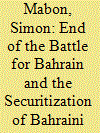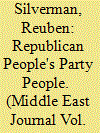| Srl | Item |
| 1 |
ID:
165783


|
|
|
|
|
| Summary/Abstract |
This article focuses on how the Lebanese government and political establishment reacted to two waves of protest movements that used slogans decrying the country's sectarian system of government. Much of the literature on Lebanon's power-sharing regime has focused on internal schisms and the challenges of mobilization against it, but little has been done to understand how it responds to anti-sectarian mobilization. I argue that the government and sectarian establishment employ co-optation, counter-narratives, and repression to demobilize protests that challenge the core pillars of sectarian representation.
|
|
|
|
|
|
|
|
|
|
|
|
|
|
|
|
| 2 |
ID:
165784


|
|
|
|
|
| Summary/Abstract |
Since protests shook Bahrain in 2011, the Saudi-backed regime there has embarked on a series of strategic moves, crushing dissent both at home and abroad. This article explores the methods the regime used to ensure its survival. It argues that by framing Bahrain's Shi'i majority as a security threat within broader regional challenges, the regime was able to solidify its core bases of support.
|
|
|
|
|
|
|
|
|
|
|
|
|
|
|
|
| 3 |
ID:
165787


|
|
|
|
|
| Summary/Abstract |
Using Iraqi archival resources and newspapers, this article analyzes strategic perceptions of the multilateral United Nations embargo (1990–2003) by Saddam Husayn and his Ba'th Party. It shows how the regime prioritized agricultural self-sufficiency to break the embargo, used food rationing to avert famine, and instrumentalized food trade to reward cronies and punish opponents. Food security, hydropolitics, and agriculture ranked prominently in regime discussions as they were regarded as crucial to safeguard political legitimacy and assure regime survival.
|
|
|
|
|
|
|
|
|
|
|
|
|
|
|
|
| 4 |
ID:
165786


|
|
|
|
|
| Summary/Abstract |
Though it was the Democrat Party that governed Turkey from 1950 to 1960, and whose successes and excesses shaped the conditions of democratization, the previously ruling Republican People's Party played a crucial role as well. Drawing on newspapers, memoirs, and parliamentary debates, this article considers how the party's leaders and its young cohort of future leaders reacted to defeat, redefined themselves as members of the opposition, and contributed to a polarized political culture that persists today.
|
|
|
|
|
|
|
|
|
|
|
|
|
|
|
|
| 5 |
ID:
165785


|
|
|
|
|
| Summary/Abstract |
This article examines the growth of sectarianism in Turkish politics since the 2011 Arab uprisings, particularly when it comes to the government's portrayal of the Alevi community as a security threat. Comparable to elsewhere in the Middle East, this "sectarianized securitization" of domestic politics was catalyzed by the overlap of external geopolitical competition and internal challenges to the government. These dynamics are situated within the context of longer-term processes of nation-building, the nature of Islamic authority, and the increasing prominence of Islamists.
|
|
|
|
|
|
|
|
|
|
|
|
|
|
|
|